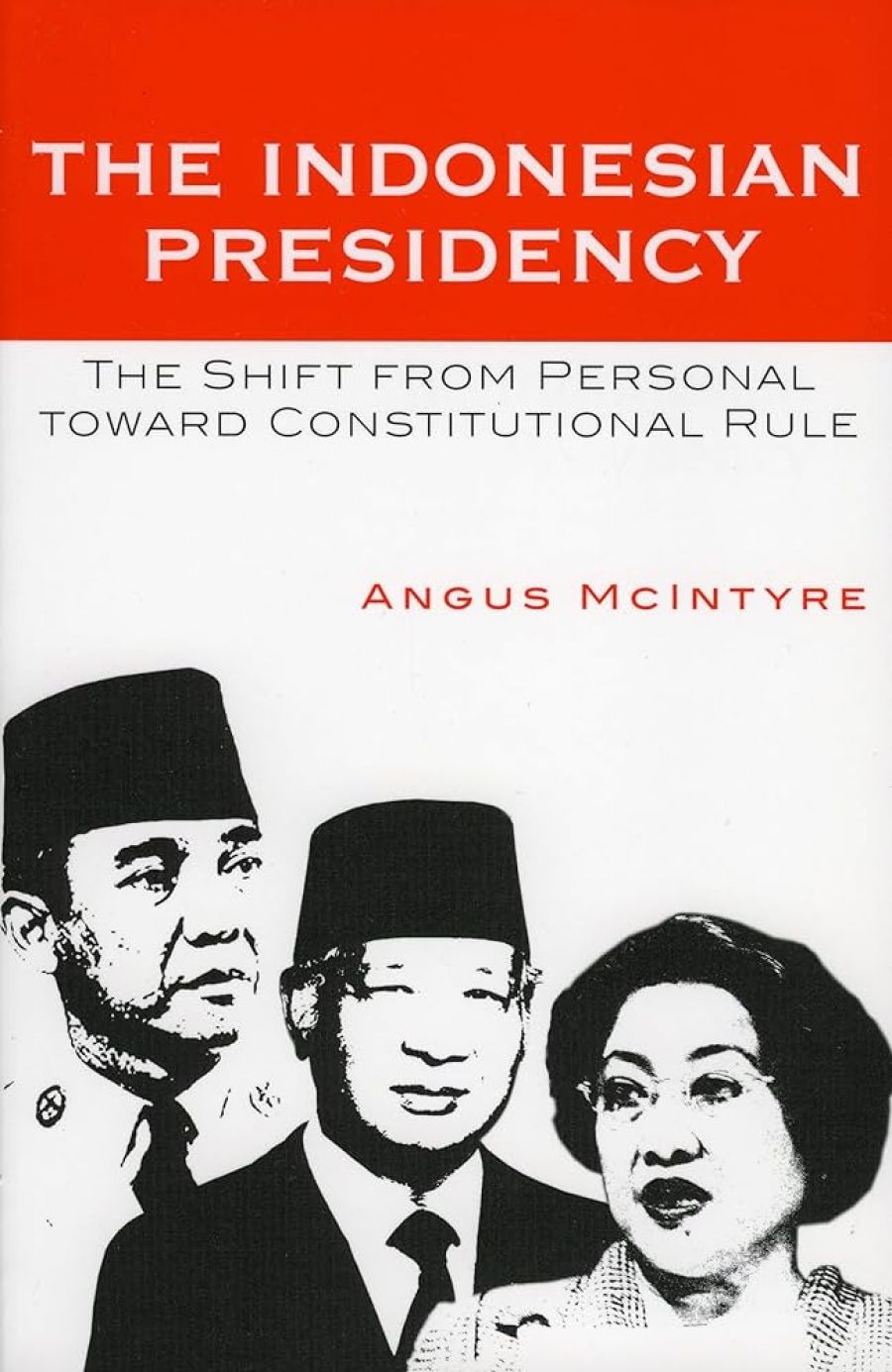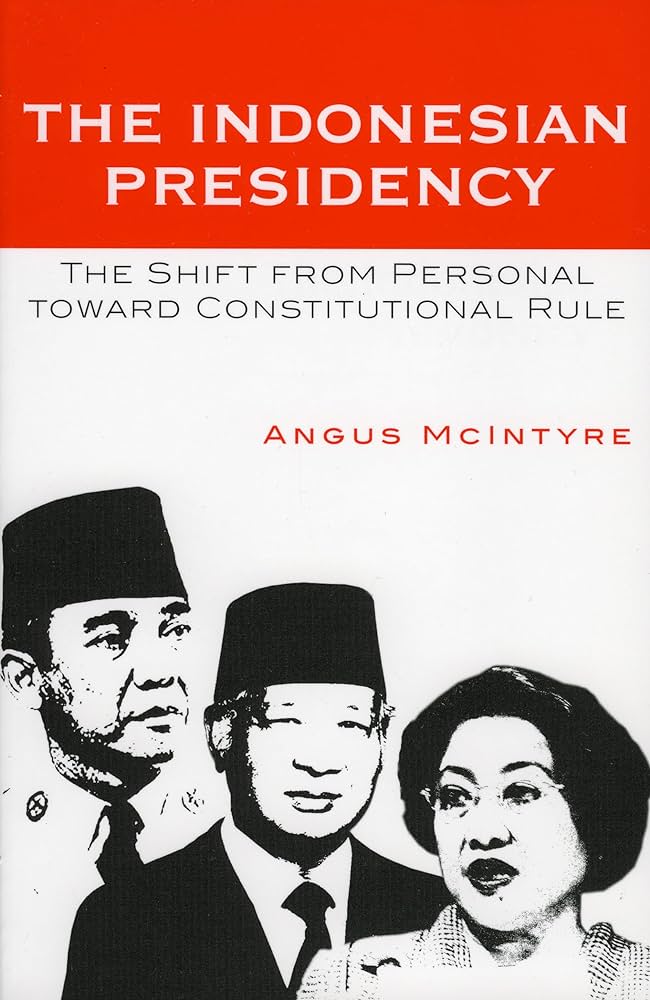
- Free Article: No
- Contents Category: History
- Review Article: Yes
- Article Title: After Suharto
- Online Only: No
- Custom Highlight Text:
So much has been said or written about Indonesia’s political changes since 1998 it might be thought that there was little original that could be added. Then along comes Angus McIntyre with his own particular interpretation of Indonesian politics. McIntyre has long been interested in the psychological make-up of Indonesia’s political leaders and has written some fine papers on the subject, the core of which are in his new book, The Indonesian Presidency: The Shift from Personal toward Constitutional Rule. His approach has been to examine the personalities of dominant individuals as a key explanatory factor in Indonesian politics. As a conceptual counter to Richard Robison and Vedi Hadiz’s recent book, Reorganising Power in Indonesia (2004), McIntyre’s approach similarly begs the question as to whether it is structure or agency that shapes events. In this, McIntyre almost entirely ignores structure, at least beyond the malleable Indonesian constitution.
- Book 1 Title: The Indonesian Presidency
- Book 1 Subtitle: The shift from personal toward constitutional rule
- Book 1 Biblio: Rowman and Littlefield, $69.95 pb, 303 pp
- Book 1 Cover Small (400 x 600):

- Book 1 Cover (800 x 1200):

There is no doubt that the personalities of Presidents Sukarno and Suharto did contribute greatly to shaping the circumstances of their political environments. As McIntyre also notes, the personalities of the short-lived presidencies of Bacharuddin Jusuf Habibie, Abdurahaman Wahid and Sukarno’s daughter, Megawati Sukarnoputri, also influenced their period of rule, although with less direct force. McIntyre regards this reduction of personal impact, and attendant political changes, as describing a shift in Indonesian politics from personal to constitutional rule. There is evidence that there has been such a change in Indonesian politics, although the extent to which the personal was exempt from external factors and the degree to which constitutionalism and an attendant rule of law has imbued the Indonesian polity remains ambiguous.
Although McIntyre says this book takes a psychological approach, a substantial proportion of it is concerned with describing a number of key events in Indonesian political history. The detail of some of these – particularly in the period after 1998 – is in places rich. In others, however, it is a little patchy and occasionally debatable.
Writing history is a subjective exercise and historians – even political analysts – do tend to write histories as legitimising their preferred view of more contemporary events. McIntyre is no exception to this tendency, although this does not invalidate his perspective, and his admirable circumspection further qualifies his preferences. It is unfortunate, though, that Sukarno, Suharto and Megawati receive a solid psychological treatment, while the colourful and highly idiosyncratic characters of Habibie and Wahid do not. This is especially so, given that it was on their watches that Indonesia underwent the ‘shift’ of the title.
While McIntyre has an early enthusiasm for Megawati, he clearly becomes uncomfortable with this somewhat rosy assessment. It was, admittedly, hard not to be outraged on her behalf by the attack on the headquarters of her party, PDI-P, in 1996, or swept along by the pro-Megawati fervour of June 1999. Yet even then her complete lack of policies did not augur well. Like so many others, having pinned his colours to Megawati’s mast in the 1990s, McIntyre comes away disappointed and confused. In particular, after offering a very sympathetic view of Megawati prior to 1999, the situation thereafter becomes more complex, to the point where during her presidency he admits that: ‘This hapless biographer has tried hard to explain Megawati’s regard for the military but … he is struck by the incompleteness of his previous formulations.’ On the following page, though, he gathers strength and, deciding that it was not his analysis that was wanting but her personality, announces that: ‘It is difficult to escape the impression that Megawati has changed in recent years’ and, on the page after that, Megawati’s ‘expansion of self-regard [was] matched by a corresponding shrinking of ideals’.
McIntyre partially joins the chorus of Indonesia observers who say that Megawati was never much of a democrat (‘a reluctant constitutionalist’), had for most of her political career relied on what was to become the dominant faction in the military, was unable adequately to administer or respond to pressure and, on balance, did not display any sign of great intellect (according to Wahid, she is ‘stupid’). Her presidency, not surprisingly, is viewed in Indonesia as a failure, if not a disaster.
One might take more exception to McIntyre’s repetition of Megawati’s ‘democratic’ claim for the presidency. While Megawati’s party, PDI-P, had the greatest single bloc of votes in 1999, more than two-thirds of the electorate voted elsewhere. Assuming the legitimacy of a representative political process, the coalition that elected Wahid over Megawati exercised an absolutely democratic prerogative. And when Megawati did assume the presidency, after the constitutional coup against Wahid, she did so with the support of a corrupt and venal élite and of a brutal, self-serving military.
Indonesian politics is complex, convoluted and deeply contested at just about every level. As a consequence, no book on Indonesian politics can do justice to the subject; all are therefore vulnerable to criticism. McIntyre’s book is no exception. Yet despite some question marks over omissions or interpretation, it is both engaging and informative, and it is easy to share much of his overall perspective.
On balance, the greatest value of McIntyre’s book lies less in its account of Indonesian political history, of which there are now many, than for its insights into three of Indonesia’s leading political actors, Sukarno, Suharto and Megawati. For those who have not read McIntyre’s earlier writing, these insights alone make this book worthwhile.


Comments powered by CComment